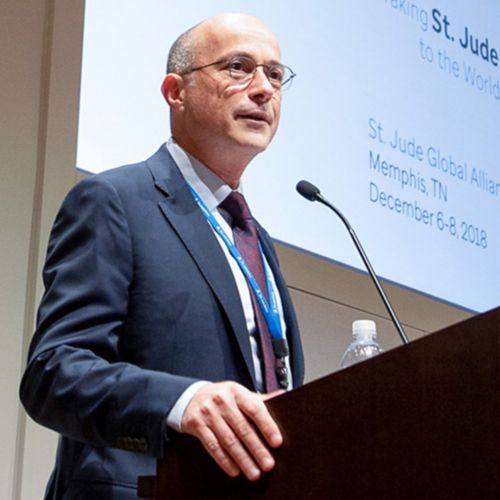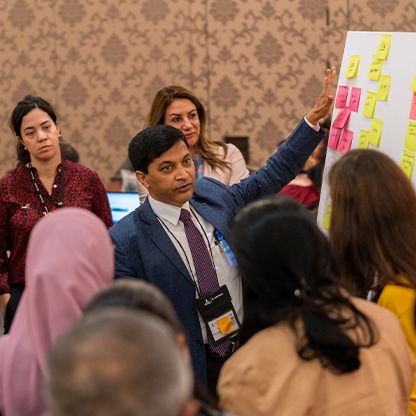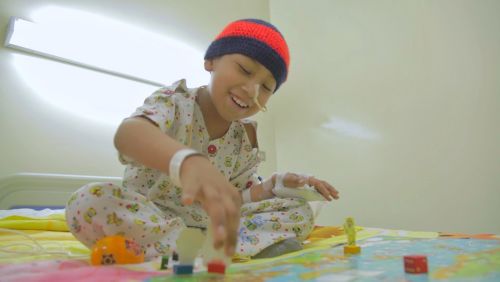Critical Care
The Global Critical Care Program strives to strengthen care for critically ill children with cancer everywhere.
Children with cancer and other catastrophic diseases frequently develop acute, critical complications. One in every three or four patients with cancer will require pediatric intensive care unit (PICU) care at least once during their cancer treatment. Unfortunately, these patients also have a higher risk of death during critical illnesses. This risk is especially true in settings with limited resources.
Common critical illnesses in children with cancer and other blood disorders include sepsis (severe widespread infection), respiratory insufficiency and serious neurological complications such as seizures or encephalopathies. Improving the management of these illnesses is integral to developing new global standards and improving patient outcomes, including reducing rates of toxic death.
Aligned with the St. Jude Global mission and with more than 1,200 collaborators from 79 countries, the Global Critical Care Program aims to strengthen hospital care for critically ill children with cancer and other catastrophic diseases through its work in five focus areas:
- Implementation of innovative, evidence-based interventions
- Education to enhance skills and knowledge
- Research of the highest quality, paired with effective dissemination
- Assessment tools to help partner centers improve quality of care
- Collaboration with a global network of partner institutions and individuals
Program Initiatives
Implementation of Evidence-Based Interventions
The Global Critical Care Program's evidence-based interventions are designed to improve the quality of care for critically ill children with cancer. Currently, key efforts include the multicenter Pediatric Early Warning System (PEWS) program and its sibling program, the PEWS Adaptation to Support Hospitals in the Alliance (PASHA), which are dedicated to supporting participating hospitals in implementing and sustaining a system that promotes the early identification of clinical deterioration in hospitalized children, thus increasing the window for treatment and patients’ chances of recovery.
Proyecto EVAT, our most extensive PEWS implementation collaborative effort, now features 99 participating pediatric hematology-oncology centers in Latin America and Europe. During a four-year, multicenter study, PEWS implementation was shown to reduce mortality by 18% over four years in 32 centers in Latin America.
Project PASHA recently launched as an adaptation of the EVAT implementation methodology, focusing on scalability. Project PASHA’s pilot run is now underway, encompassing 11 centers in Sub-Saharan Africa, Pakistan, Eastern Europe and the Asia Pacific region.
Education
To improve health care providers’ knowledge about the care of critically ill children with cancer, the Global Critical Care Program works with experts in the field to develop curricula, workshops and training materials on pediatric onco-critical care. These efforts include:
- Pediatric onco-critical care workshops and conferences, including the annual Pediatric Onco-Critical Care Symposium (POCCS) at St. Jude.
- The St. Jude Global Academy in Pediatric Onco-Critical Care (GA-POCC).
- Critical care observerships in the St. Jude pediatric intensive care unit.
- POC3, a clinical case review resource connecting providers to experts in the field to review and analyze complex cases about onco-critical illness and management.
- Monthly meetings to discuss relevant topics in pediatric onco-critical care and encourage collaboration between participants to build our pediatric onco-critical care community.
Research
The Global Critical Care Program develops research tools and conducts high-quality research on topics related to pediatric onco-critical care in high-resource and resource-limited settings. These efforts include:
- Working with regional experts to develop common data elements that investigators and clinicians can use to study the global epidemiology, burden and outcomes of critical illness in children with cancer. One example is POCIReg, the Pediatric Oncology Critical Illness Registry.
- Using implementation science methodology to study the implementation and sustainability of evidence-based interventions in low-resource settings. One example is our work with the Clinical Sustainability Assessment Tool (CSAT), a structured assessment of a center’s capacity to sustain an evidence-based practice like PEWS. These findings can guide a sustainability action plan and inform the development of strategies to promote intervention sustainability in these settings.
Assessment
The Global Critical Care Program has also developed several tools that centers can implement to assess current pediatric onco-critical care services and identify priorities for future interventions.
PROACTIVE (Pediatric Oncology Capacity Assessment Tool for Intensive Care) is a tool to assess the capacity and quality of pediatric onco-critical care in resource-limited settings. Centers participating in annual PROACTIVE cohorts (available in English and Spanish) receive a report identifying areas of strengths and opportunities to improve care.
CritCom is a provider survey to evaluate the quality of team communication across disciplines (ICU, oncology, etc.) and professions (nurses, physicians) for children with cancer who are at risk of deterioration. As with PROACTIVE, centers completing the CritCom assessment receive a report evaluating the quality of interdisciplinary communication across six domains.
Collaboration
The program’s horizontal collaboration network brings together providers, institutions and organizations interested in improving the care and survival of critically ill children with cancer worldwide by sharing knowledge, experience and best practices. The network includes:
- Brown School – Washington University in St. Louis
- PALISI (Pediatric Acute Lung Injury & Sepsis Investigators) Network, a Global Health subgroup
- PALISI Global Health Research Series
- WFPICCS (World Federation of Pediatric Intensive & Critical Care Societies)
- SIOP (International Society of Paediatric Oncology)
- SLACIP (Latin American Society for Pediatric Critical Care)
- SCCM (Society of Critical Care Medicine)
- LARed (Latin American Research Network)
- AMTIP (Mexican Association of Pediatric Intensive Care)
- POKER (PICU Oncology Kids in Europe Research Group)
Our Team
Asya Agulnik, MD, MPH
Director, Global Critical Care Program
Director, Euro Regional Program
Adolfo Cardenas-Aguirre, MD
Program Manager, Global Critical Care Program
Maria Puerto Torres
Program Coordinator, Global Critical Care Program
Stacey Wiedower, MS
Program Coordinator, Global Critical Care Program
Samantha Hayes, MPH
Program Specialist, Global Critical Care Program
Contact
To learn more about the Global Critical Care Program, email globalcriticalcare@stjude.org.
If you would like to be part of the Global Critical Care Program distribution list, please complete this form:


